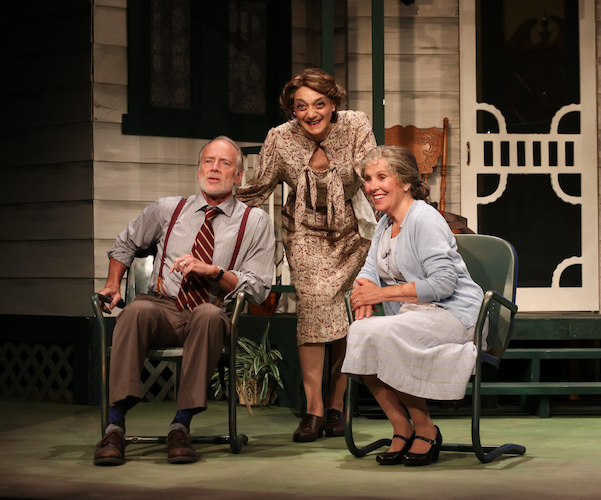Theater Review: “Morning’s at Seven” — Ensemble Excellence
By Jim Kates
This production of Morning’s at Seven is a celebration of Peterborough’s theatrical family as much as it is the depiction of a fictional one.
Morning’s at Seven by Paul Osbourn. Directed by Gus Kaikkonen. Staged by the Peterborough Players at 55 Hadley Road, Peterborough, NH, through July 28.

Greg Wood, Becky London, and Kathy Manfre in the Peterborough Players production of “Morning’s at Seven.” Photo: Emily Fitzgerald.
Put a family of four sisters on stage, throw in three discontented husbands, a maladroit younger couple trying to work out their own terms of existence. Add desired, disputed property, and I know what you are thinking — Chekhov. Then try to imagine Chekhov filtered through the incongruities of screwball comedy in the 1930s and set in a culture of emotional and inarticulate repression in the Upper MIdwest. Play it as farce. You’ll come up with something like Paul Osborn’s Morning’s at Seven, which first appeared in 1939 and now romps across an elaborate stage at the Peterborough Players.
In the first act the characters are unable to communicate with each other. A tight-knit family has nothing to say. Awkward silences trip over each other. In the second act, they all find their voices, and they stumble over their own past inarticulateness into a resolution that’s far more pat than anything Chekhov devised.
Although the action on stage does not follow completely logically, the action of the staging meshes without a jar.
The cast of nine is comprised completely of old stagers from this repertory company, actors who have worked together for years. They know how to play to their own and one another’s strengths. This production of Morning’s at Seven is a celebration of Peterborough’s theatrical family as much as it is the depiction of a fictional one, while their long-time director, Gus Kaikkonen, choreographs movement in a kaleidoscope of interactions.
Just last week we saw Becky London as Gertrude Stein, and now she returns as the only unmarried sister, Aaronetta Gibbs, tall and Gothic, moving across the stage like a figure designed by Edward Gorey, lamenting and then taking control of her fate. Dale Hodges (who was Toklas in that last production) is more wispily ferret-like, dashing in and out of the scene as Ida Bolton, the sister next door caught between her son Homer (Tom Frey) and her husband Carl (Kraig Swartz), who is desperately trying to work out the meaning of his life.
Slow without being oafish, Frey brings a richness to Homer Bolton, both in his voice and in his gestures, with a subtlety that hasn’t been apparent in past productions. A moment when his hand hesitantly reaches behind his fiancée’s back carries all the genuine feeling Morning’s at Seven can generate. Homer is introduced to us as shy, and might easily come across as stupid, but Frey’s humanity predominates.
We expect as much from Swartz. He has grown through the decades now from a brash clown into a mature actor of delicacy and depth without losing comic timing and a presence that automatically commands attention. He knows how to wear his suspenders. His existential despair as Carl is palpable, but not grim. When he leans his head against a tree, he is eloquent.
Bridget Beirne plays Myrtle Brown, the fiancée, with a full measure of Midwestern Niceness, the kind that can courageously fend off any threat of difficulty with denial, and that manages, most of the time and improbably, to cope with the real world. Beirne bursts with an optimism that eludes the others, however much they keep up appearances. You want to throttle her, and you understand why Homer wants to marry her.
Third sister Cora Swanson (Kathy Manfre) provides the motive that drives what plot there is in Morning’s at Seven by interfering in plans for the disposition of property Carl has set aside for Homer. Manfre acts out a bitterness that covers up a powerful longing for reassurance from her husband. Theodore (Greg Wood) seems, at the start of the play, to be the most expressive of the whole family, but his is an expressiveness without point, a playfulness for show. Wood conveys the hollowness behind the resonance.
Lisa Bostnar is the fourth sister, Esther, who meets with her family in defiance of her own controlling husband David Crampton (Ken Sheldon). Bostnar and Sheldon make a well matched pair, and as the control shifts from him to her, we can watch them both, quite literally, take heart. We come to believe in a reconciliation that has meaning for both of them.
But to single out these performances is to miss the point of the ensemble’s merit. the total surpasses the sum of its parts. The title of Morning’s at Seven, a quotation from Robert Browning, is as incongruous as much else that goes in the course of the play. But never mind, Curtain’s at 7:30 — by 10 p.m., all’s right with the world.
Jim Kates is a poet, feature journalist and reviewer, literary translator and the president and co-director of Zephyr Press, a non-profit press that focuses on contemporary works in translation from Russia, Eastern Europe, and Asia. His latest book is Paper-thin Skin (Zephyr Press), a translation of the Kazakhstani poet Aigerim Tazhi.

A definite must miss.